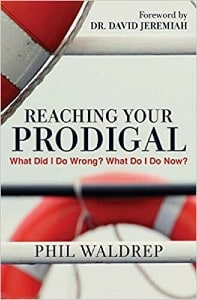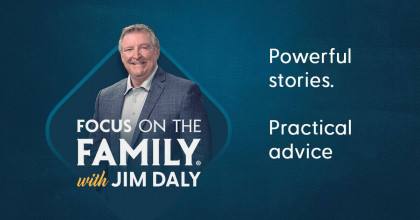Phil Waldrep: You can be the world’s perfect parent and still have a child that becomes a prodigal. So the question is, what did I do wrong? I did the research. You probably did nothing wrong.
John Fuller: Well, if you have a wayward child, today’s speaker has encouragement for you. Welcome to Focus on the Family. Uh, your host is Focus president and author, Jim Daly. And I’m John Fuller.
Jim Daly: John, our guest, Phil Waldrep, is a pastor and author who has worked with a lot of heartbroken parents who have prodigal children. And the message you’re about to hear is the result of research he did with 30 prodigals, half of whom had recently returned to the Lord. And I think you’ll be impressed with his insights.
John: And there’s a lot more in his book, which is called Reaching Your Prodigal. We’ve got that here at Focus on the Family. Uh, stop by the website to get your copy. With that, here now is Phil Waldrep.
Phil: If you have a prodigal, I want to share with you tonight six things you need to do that, uh, the Lord can use to help bring your prodigal back to him. The first step you need to take is the one you can start practicing tonight, you need to overcome the guilt. You need to rest in the Lord and ask Him to help you to get over the guilt.
You see, when people ask that question, “What did I do wrong?” here’s what they’re saying, “Apparently, I failed as a parent. Apparently, I made a mistake because if I had done it right, my kids would turn out right. So if my kids are not walking with the Lord, then apparently, I did something wrong.”
But before I answer the question, can we stop and ask why do we feel guilty? Well, the enemy wants you to feel guilty because as long as you’re walking in guilt, he has control of the situation. And if you, as a parent or grandparent, ever start walking in victory, he will have first experience defeat. So he wants you to feel guilty. So what does he use to make us feel guilty?
Well, I’ve discovered there are two sources of our guilt. First, we forget something about our kids and our grandkids that we know, but we never apply it to our children. All of us are sinners. All of us are bent toward sin.
To put that another way, if all of us do what is natural for us to do, all of us become prodigals. It’s not taking away from the seriousness to say that when your child chooses to walk away, they are doing what is natural for them to do. But there’s a second source of our guilt, and it comes from a misunderstanding of a verse in the Bible because people always say, “But Phil, what about that verse that says, ‘Train up a child in the way he should go. And when he’s old, he will not depart from it'”?
Now, that says, if you do it right, they turn out right. Can I tell you something tonight? You cannot find me three Old Testament scholars who understand Hebrew who will tell you that verse properly translated, says, “You do it right, they turn out right.” There’s a school of thought that if you’ve read books by Dr. Warren Wiersbe, for example, who’s a great Bible teacher. He says that Proverbs are principles, not promises.
But others say, and I tend to agree, “When you understand the Hebrew words, the original language, the phrase, the rearing of a child referred to the growing of a tree.” And it has the idea of the bent of a tree that if a tree was bent in a certain direction, if you applied pressure against it, it would break, and it would begin to die, which simply meant nothing about parenting, except that if we have children who have an interest in something, if we encourage and train them in that interest, they will pursue it for the rest of their life.
For example, if you had a child who loves music and you give them music training, they will love music the rest of their life. On the contrary, if you have a child who doesn’t love music or isn’t musically inclined and you try to force them to love music, they probably will hate music the rest of their life. And I see that played out in my own life. I remember one day when my mother came home and she said, “Mrs. Smith has an opening, and you are going to get to take piano lessons.”
Audience: (laughing)
Phil: And I said, “Mom, have I got news for you. I don’t want to take piano lessons.” And my mother says, “Oh, you don’t understand. You’re going to go. You’re going to love playing the piano.” I went to Mrs. Smith, who was this wonderful lady, went to her house, 30-minute lesson. That was the longest 30 minutes of my life. I have no musical interest. I love music, but I have no interest in playing.
But I said, “Mother, I didn’t like it.” She said, “Oh, you’ve got to go two or three times.”
Audience: (laughing).
Phil: But you see, in defense of my mom, she had a dream because in her family, there are no musicians. However, in my father’s family, there are many musicians. Now, my father wasn’t. But my grandfather, I’m told, could play 12 different instruments by ear. And my mother knew I had my father’s genes. And if she could just bring that musical gene to the forefront, then I would be the first musician in her family. So for nearly four long years-
Audience: (laughing).
Phil: … I went to piano lessons. And finally, after four years, my mother looked at me tears in her eyes and she said, “Son, I don’t think you’re enjoying taking piano lessons.”
Audience: (laughing).
Phil: Little slow, but she gets there.
Audience: (laughing).
Phil: But that’s an example. You see, that verse would say to my mom, “He has no interest. He’s not bent that way. So he’s not going to pursue it.” On the other hand, if I had musical interest and was taught, I would pursue it. But I said all that to say that verse does not teach if you do it right, they turn out right.
If you believe that if parents do it right, their kids turn out right, would you please tell me tonight what God did wrong with Adam and Eve? What did Jesus do wrong with Judas? You can be the world’s perfect parent and still have a child that becomes a prodigal.
Audience: Amen.
Phil: So the question is, “What did I do wrong?” I did the research. You probably did nothing wrong.
Audience: Amen.
Phil: So from this day forward, until the Holy Spirit tells you what you did wrong, you must say to the devil, “I did nothing wrong, and I will not feel guilty anymore.”
Audience: Amen. (applause)
Phil: But then there are those who will say, “But wait, I know what I did wrong.” Sometimes, we do make mistakes as parents, and we do things that hurt our family. And when you do, you need to go to your prodigal and say, “I was wrong. I sinned. Will you forgive me?”
Now, I need to tell you, they don’t always grant forgiveness. But when you ask for the forgiveness, when you know what you’ve done wrong or the Lord has told you what you’ve done wrong, or even if your prodigal tells you what you’ve done wrong, don’t try to debate it. Just acknowledge and say, “You’re right. Will you forgive me?” And when you acknowledge and ask for forgiveness, it removes the barrier and the excuse they can use.
But then there’s a third thing you must do. You must continue to love your prodigal without conditions. You must love them unconditionally. “Well now, Phil, I need to tell you I do love my prodigal unconditionally.” Oh, really? Do you have a child tonight that you would prefer I didn’t know belonged to you?
Audience: (laughing).
Phil: Do you have a child that you have put your head on the pillow and cried and privately said, “God, I wish they had never been born”? If so, that’s not unconditional love. Unconditional love says, “I may not approve of what you’re doing. But I love you the same.”
In the story of that wonderful father in the Gospel of Luke, the son did the, the one thing that hurt his father. When you understand the Jewish culture of that day, for a son to have anything to do with pigs was horrible, far worse than any alcoholism or drug addiction or gambling addiction or, or sexual sins, far worse than any of that, was to have a son associated with pigs. But the father never stopped loving his son.
John: You’re listening to Focus on the Family, and that’s Pastor Phil Waldrep, uh, offering hope. And, uh, you can get his book, Reaching Your Prodigal, when you contact us and make a donation of any amount to the ministry of Focus on the Family. When you do that, we’ll include a free audio download of his entire presentation as well. Donate, and request those at focusonthefamily.com/broadcast, or give us a call 800, the letter A, and the word FAMILY, 800-232-6459. Let’s go ahead, and hear more now from Phil Waldrep.
Phil: Let me give you two illustrations tonight of two men who experienced virtually the same thing. Watch how these two men responded and see if you can identify which father in these two stories practiced unconditional love. In a church not far from where we live, there was a man that you would call a pillar member of the church, I mean a, a very revered man, a very godly man.
And one day, his teenage daughter came home and said, “Dad, mom says she will not tell you, and I must tell you, but I’m pregnant.” And, of course, the girl wasn’t married. And the father, by his own testimony, said he got angry. And he began in his anger to pound on the coffee table and say, “I cannot believe you have done this. You have disgraced this family.” And in his anger, he looked at his daughter, and he said, “I want you to get your things. I want you to leave. I never want to see you again. And as far as I am concerned, from this day forward, you and this child are dead.”
And she left. The father bragged about what he did. But in the church that he attended, about six months after that happened, they were having a Sunday evening service when the pastor walked to the pulpit after the singing, and the pastor of his church said, “Tonight, I just want to talk to you as my congregation.” He said, “We have learned this week that our 15-year-old daughter is gonna be an unwed mother. Our hearts are broken. We are embarrassed. We have cried a lot at our house. And I’m here to tell you that my wife and I have made a decision.” The pastor said, “We’re gonna love our daughter. We’re gonna support our daughter. She has chosen to give life to this child. We’re gonna help her if necessary, rear this ch… this daughter. And if that means that you want me to step down as your pastor, I will, and I will take secular employment.”
And then the pastor said, “I want you to know that while I am ashamed of what my daughter has done, my wife and I are not ashamed. She is our daughter.”
Audience: Amen.
Phil: And in the presence, in the presence, of that congregation, he walked over to his daughter, embraced her and said, “I love you.” Two men facing similar situations. Can I ask you tonight, which of those two daughters do you think is in church tonight serving God? It was the one who experienced unconditional love. You say, “But Phil, if we extend unconditional love, aren’t we approving their sin?”
Well, may I ask you, did God approve your sin when he gave you unconditional love? Of course not. And I’ve discovered the one force that prodigals can’t handle, is unconditional love. Now, with that being said, I need to hasten to the next point because this is where many people misunderstand unconditional love because unconditional love re… loves people regardless.
But here’s the next point, you must also stop removing the consequences of their decisions. Unconditional love does not say, “Every time they get in jail, I’m obligated to get them out.” That’s not unconditional love. Unconditional love does not say, “Every time they lose everything to gambling, I’ve gotta go and pay the gambling debts.”
That’s not unconditional love. I believe you can extend grace the first time. But prodigals can become great manipulators, and they can try to manipulate you, “Oh, daddy, oh, mommy. If you would just, one time, if you would just pay these debts, I’ll go to church. I’ll serve God, I’ll be a missionary. If you…” No. And you have to look at ’em and say, “Son, daughter, I love you. And I’ll come visit you every day in jail.
Audience: (laughing).
Phil: And I’ll be there for you to go with you to get counseling for your addictions, but I cannot rescue from the pigpen.” So let me cancel you tonight. Stop removing the consequences. When they make bad decisions, let them face the consequences. They may get angry. They may get upset. But trust me, sometimes, prodigals come to themselves when they sit in pigpens for a while.
Then there’s a fifth thing. Guard your words. Watch what you say. When I interviewed those prodigals, one of them said something to me, and he put it best. He said, “You know, Phil, I don’t understand my mama.” I said, “You don’t?” He said, “No. She tells me all the time how she can’t stand her preacher, worst preacher she’s ever had. And she tells me all the time how she don’t like the music at her church. Why, she said they’ve ruined the music program in her church. And she tells me all the time, how sorry the people in her Sunday school class are that she’s just tired of all of those hypocrites at her church.
And then next Sunday, she’s in shock when I don’t want to go to that sorry church and listen to that awful music and that terrible preacher.”
Audience: (laughing).
Phil: You… Let me tell you what the devil does when we get in a complaining mode about church, he takes a megaphone, and he magnifies it to your prodigal. He does. Now, granted, I’m like you. Sometimes, you know they do things at church in our church, and I didn’t like it. I’m going quite a bit speaking. So I’m not there a lot. And every time I go, they move my Sunday school class.
Audience: (laughing).
Phil: I’m getting older. It’s on the top floor.
Audience: (laughing).
Phil: Can I tell you something? I don’t want to sacrifice my kids or my grandkids because I’m being petty over something I want.
Audience: Amen.
Phil: Instead, I want to use words that build up and affirm because you know the very person you dislike the most at church may be the very person God’s trying to use (laughs) to get the attention of your prodigal. Hey, and let me take that another step. Don’t just guard your words about while your child is a prodigal. Guard your words when they get right with God.
Did you notice in Luke 15 in that story when the prodigal son came home, his father did not do what most of us would do? See, we would fold our arms and say, “Okay. (laughs) Where have you been? Don’t you want to tell us about all them pigs you’ve been with?”
Audience: (laughing).
Phil: “And don’t you want to explain how you spent all that money?” Father didn’t do that. The father had enough sense to keep his mouth shut. No. When your prodigal gets right with God, you kill the fatted calf. Think about that. (laughs) You kill the fatted calf. And you rejoice, and you praise God.
Then there’s a sixth thing, pray specific prayers. When I’ve talked with prodigals who have gotten right with God, I’ve noticed there are two things God uses on a consistent basis to get the attention of a prodigal. Now, if that’s true, shouldn’t this be the two things you’re praying tonight? The first thing God uses is someone who is a friend, someone their age, who comes into their life, who has a heart for God.
And through that friendship, it might be a co-worker, it might be, uh, another lady at the PTA council, it can be a next door neighbor. But someone comes into their life. A friendship is formed, but that friend has a heart for God. And God uses that friend to nudge your prodigal back to him.
So the first thing you pray is, “God, would you bring into the life of my prodigal people who have a heart for you?” And then there’s a second prayer you pray, and it’ll be the hardest prayer you’ve ever prayed. But if you can pray this prayer and mean it, all this other stuff is easy. When I talk to those prodigals who have gotten right with God, I discovered that the majority of them is either a friend who nudged them back to the Lord or it was the sickness and death of a parent or grandparent.
So are you willing to say tonight, “Lord, I am willing to do whatever it takes. If it means you have to take me on the glory, I’m willing to do it if it gets my prodigal back to you.” Tough prayer. In our office, several years ago, one of our staff members had a suggestion. He suggested that we take Wednesdays and have everyone bring their lunch. And then we assign one of those Wednesdays to each staff member, you know, each of them take a Wednesday.
And on that Wednesday, they all share their personal testimony. Well, I knew for one girl in our office that was going to be very difficult to share because she’s related to me. Her grandfather was my mother’s oldest brother. Her grandfather was my uncle. And I don’t know if you’ve ever noticed it, but when you give your testimony, the hardest place to share is in front of relatives, especially the ones that have known you all your life.
So I’ve known her all of her life. I knew she became a Christian when she was young. I know when she went to college, she became a prodigal. And I knew she had gotten her heart right with God. But I was going to be in town the day she shared. I knew it would be hard for her. And it’s one of those situations you’re like, “Well, I need to be here. I’m in town, but I don’t need to be here. It would be hard for her to share.”
And so I remember I just… My prayer time, I told the Lord, “Lord, I don’t know whether to be here or not.” And that day, I got a call. And my wife and I got invited to a banquet, a luncheon engagement we needed to go to. And so I said, “Well, we’ll go to that. That’s a word from the Lord.” So we agreed to go to the luncheon.
So I went in to… On Tuesday, before that Wednesday into Marla’s office. And when I did, I said, “Marla, I gotta tell you something. I’m not gonna be here tomorrow when you share.” I don’t believe I could have told her she had won the Publishers Clearinghouse Sweepstakes, and she would’ve been any happier.
Audience: (laughing).
Phil: She looked at me and said, “Woo, I’m glad I’ve been praying all week you’d be sick tomorrow and wouldn’t be able to come to work.” And I-
Audience: (laughing).
Phil: … don’t have to do that. And so the next day, we went to the luncheon. I came back, went into the office of a young man who was an intern at… with our office at that time. And I said, “How did Marla do?” “Oh, she did great.” Told how she became a Christian as a young girl, came a prodigal, got away from the Lord in college, and how it was through the sickness and death of her grandfather, my uncle, that got her heart right broken before the Lord.
And that day when I left, I sat in my car for a moment because that meant something to me when I heard it, because I was very close to her grandfather. I remember the day he came to our office, broken-hearted over some of his grandkids. And I remember the day in our office, he prayed and poured his heart out to God and said, “God, whatever it takes, I want you to do it to get the attention of my grandchildren.”
And he said, “Lord, if it means you’ve got to take me home to glory, I want you to do it.” Less than a year later, he was diagnosed with terminal cancer. And for two and a half months, he fought through treatment. But then he died. And it was during that two and a half months that Marla got her heart right with God, wrote her grandfather a letter. Her father read it to him on his deathbed.
And as I sat in my car, I said, “Lord, thank you for a grandfather who is willing to say, ‘Whatever it takes, I’m willing to do.’ Thank you for that.” And then I thought, “Lord, wouldn’t it kind of a shame that her grandfather never got to see her really grow in the Lord and her husband came to know the Lord, and he’s a deacon leader in their church and how they’re involved in ministry.” And I said, “Lord, it’s just a shame that he didn’t get to see that.”
So I had an idea, never done this before. I said, “Lord, can I ask a favor of you?” I said, “Lord, if you are on the streets of heaven today and you see my Uncle Bud, her grandfather, would you stop him and tell him for me that his granddaughter stood today and blessed your name? Would you tell him for me that his prodigal has come home? Would you tell him for me that his prayer and his death was not in vain? Would you, Lord, just tell him for me?”
You see, I wish I could tell you, “Boy, there’s a surefire way you walk out here, it’s gonna happen.” No. What I’ve talked about tonight is putting you in a position of strength where you can help your prodigal. I’ve talked about removing the barriers so that when your prodigal comes to themself, and they will, it may not be tomorrow, it may be 10 years, but when they come to themself, that young man in Luke 15 knew he could go home to his father. There were no barriers there. So you remove all of the barriers. But you’re in a position of strength, and you’re not manipulated by guilt.
I wish there was a surefire way, but what I’m giving you tonight is hope. I’m giving you hope. But wait, you say, “But, Phil, what if it is my death that causes my prodigal to come back to the Lord? I won’t get to see it.” Can I ask you something? Wouldn’t the next best thing to seeing your prodigal get right with God down here would be hearing about it over there? Till one day, have the son of God walk up to you and say, “Have I got news for you? You know the prodigal that broke your heart, the one you thought wouldn’t make it, the one that caused you to cry yourself to sleep, they stood today and blessed my name.” May not get to see it here, but you get to hear about it over there. But the good news is tonight, that there’s hope, and prodigals will come home.
John: With a truly eternal perspective on prodigal children, that’s our guest today on Focus on the Family with Jim Daly, Pastor Phil Waldrep.
Jim: Truly is, John. And we’re almost out of time. So let me just say that if your heart is aching right now, please reach out to us. Our friendly staff would be happy to hear your prodigal child’s story and pray with you. And if needed, uh, you can request a call back from one of our caring Christian counselors. It’s a free service that we can provide, thanks to our donors.
And let me encourage you to become a donor to this ministry, to be a lifeline to other families in need. You can be part of the solution. The best way to help us is with a monthly pledge, and that helps us even out the ups and downs of the budget throughout the year. Uh, when you make a pledge of any amount, we’ll send you a copy of Phil’s book called Reaching Your Prodigal: What Did I Do Wrong? What Do I Do Now? And if you can’t make a monthly commitment right now, we understand. We’d be happy to send the book to you for a one-time gift of any amount. Get started on your journey of healing today.
John: And the starting point is focusonthefamily.com/broadcast. Uh, we’ll have details there for you to, uh, donate and request Pastor Phil’s book. Again, focusonthefamily.com/broadcast, or you can call 800, the letter A, and the word FAMILY. Next time, marriage coaches, Trey and Lea Morgan, share practical ways that you can strengthen your marriage.
Trey Morgan: We’re gonna treat one another better than they deserve, because that’s pretty much how God does, treats us every day.


















